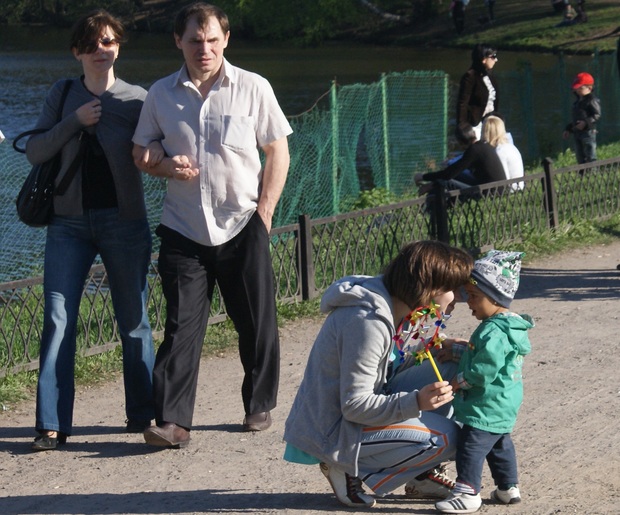‘Having a dark-skinned husband and children in Russia, you start to see the problem of racism from inside’
Children never talk about colour of the skin. Only adults are baffled
Anna Veres is a Russian girl from Tatarstan married an African man, who came to Russia, living with her husband and two boys in Moscow Oblast. Weird though it might sound, but the thorniest problem that the international family faced was racism. She told in a column specially written for Realnoe Vremya why it is better to ask the representatives of state services for help with a voice recorder, and the difference between the attitude of people of Tatarstan and the Moscovites to dark-skinned people.
Marry an African
When columns about international marriages, the choice of the Russians, Tatars as a spouse of another nation are published, commentators are not stingy with assaults, humiliation and messages, in which intolerance towards other nations and races is clearly seen, for an unknown reason. All people start to 'chew the topic over' treating as mud and think that it is correct and right. I know first-handwhat racism is. It is what I face every day going to work and on the way back.
In 2005, having moved from Tatarstan to St. Petersburg, I acquainted with my future husband. At that moment I just could not imagine my future, and that it would be connected with Africa and racism. When you are young, it seems to you that the world is your oyster and problems are easily solved in life. You cannot know that there may be some Nazi organizations that bring this propaganda to the masses day after day. It seems to you that all problems are within your power and having a husband from another country and children you won't feel any discomfort in our society, and everything what people say is just fibs and exaggeration.

I know first-hand what racism is. It is what I face every day going to work and on the way back
When people at my work knew that I had a friend from Africa, just a friend because we just got acquainted with each other and met in language courses, they did not greet me shaking my hand any more. They explained it like having such friends I stopped being an individuality for them, who would be worthy of their respect. All right, it happens to everyone, everybody has a different attitude to the world. I was asked to leave the work. Now I understand that these were calls – even not calls but bell rings that warned about the bad state of tolerance we have.
'Always take a voice recorder'
When kids appeared in our life, I started to notice a more and more negative attitude of people. When I got them a seat in a kindergarten, the head of the hospital refused to sign the medical certificate saying that, 'There is no place in the kindergarten for people like you, even there are not enough seats for the Russians'. And she said that she was going to do everything to impede us to be there…
But a voice record of our conversation, a complaint sent to the Prosecutor's Office and the Ministry of Health calmed her down, so my kids got a legal seat in a kindergarten corresponding to our permanent residence address. I understood I always should take a voice recorder because I have to prove people that racism exists.
Having a dark-skinned husband and children in Russia, you start to see the problem of racism from inside. People suppose it as an obligation to express all their disdain, insult or just sniff loudly and clearly looking at your eyes. It happens just because my family doesn't look like their families.
There was no negative attitude of the Tatars during 10 years
The topic in this blog won't be about how everything is awful and desperate but how the reaction to dark-skinned kids and the international couple in such places as Moscow, St. Petersburg, Kazan and Tatarstan backwater, including the cities beyond the Russian Federation, is different.

When kids appeared in our life, I started to notice more and more negative attitude of people
I can say at once, the change is radical. If here, in the capital of Russia, a travel by underground with kids is a last resort for me, in Kazan, the situation is much better. It refers to all public transport. Comparing the attitude of the Russian and Tatar people (who I meet), there was no negative attitude of the Tatars during 10 years. There is just an idle curiosity. Where did you get acquainted? Where is your husband from? What language do your children speak? These are the most popular questions asked everywhere: when I'm in the queue, passing a flight check-in, even when I stop to arrange a kid's rucksack near people sitting on the bench – an interrogation starts immediately but without any negative connotation.
Taking a seat in a Moscow-Kazan train and seeing that my neighbours in the car were Tatar, I can relax and continue my way calmly. They have a positive attitude and smile. It possibly happens because I'm not Tatar, and they do not care about what people the Russians get married. It is probable that I was lucky and did not meet any vocal opponents of mixed-race marriages.
I remember when my husband-to-be and I went to Kazan for the first time and he was treated with chak-chak and pasties, he was shocked by the hospitality and always asked me – 'What's the catch?'
When we got to Arzamas, we were looking for a taxi, which would take us to Diveyevo, for two hours because all 'taxi drivers' who were sparing their time near a bus station refused to have 'black' passengers (we came to an agreement with one brave man for a price two times higher than the usual). Meanwhile, when we were in a town in Tatarstan, the driver even tried to tell jokes in English and enquired with interest who we were and where we were from.

If we choose a place for a holiday in Russian big cities, resorts and Tatarstan, I will choose the latter because, as I think, people in Tatarstan are more tolerant to other races, and it is safer there
I would like to note that the further from the capitals you go, the more tolerant and calmer people are, and not only the Tatars but also the Russians. There is no aggression from them. As for Russian and Tatar children, they practically don't see any difference between themselves and my kids. Tatar children are sometimes sure that my children are also Tatar, and we never talk about the colour of the skin. Adults are more baffled.
Holidays – in Tatarstan, permanent residency – in Europe
If we choose a place for a holiday in Russian big cities, resorts and Tatarstan, I will choose the latter because, as I think, people in Tatarstan are more tolerant to other races, and it is safer there. But choosing a place for permanent residency between Russia and Europe, I will choose Europe because our family really feels safe there. We are just ordinary people there, where people don't pay such an attention like in Russia, ask questions, interfere in personal life, attack and discriminate.
More than 25 Afro-Russian families, who I personally know, migrated from Russia during 11 years. Somebody applied for refugee status in France, Norway, Germany, the Czech Republic, Spain, the Great Britain. Somebody migrated to Canada using the employment visa, somebody went to the US and is living there illegally – no one wants to come back because it is safe there, not because they have good benefits and salaries…